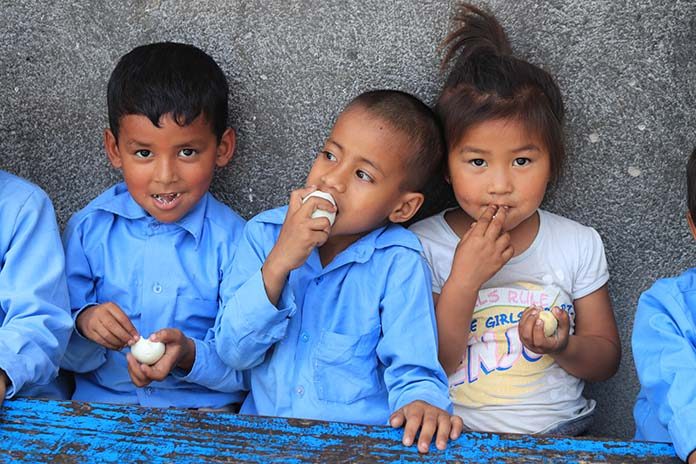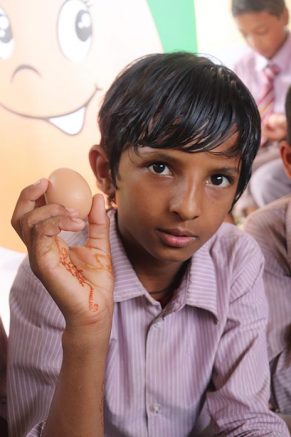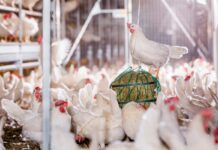
Cobb-Vantress and OneEgg – an organization attacking poverty and malnutrition through sustainable community development – recently launched new chapters in Nepal, Honduras and Ethiopia. Currently operating in 10 countries, the program provides animal protein to children in the form of eggs. Each child receives one egg a day several days a week, greatly increasing their protein consumption, which is essential for proper growth and development.
The support doesn’t stop there. To make a sustainable operation in the communities they serve, Cobb supplies technical assistance and trains participants in animal husbandry, poultry housing design, flock management, egg production, marketing, sales, business management and more. So, families raise the chickens that lay the eggs, add to the local economy and provide jobs in the community. Since Cobb began working with OneEgg in 2008, 10 million eggs have nourished approximately 10,000 at-risk children around the world.
New chapters in Nepal, Honduras and Ethiopia
Continuing their mission to increase the availability of animal protein to children around the world at risk of malnutrition, Cobb-Vantress and OneEgg recently launched new chapters in Nepal, Honduras and Ethiopia.
Participating children receive one egg a day several days a week, greatly increasing animal protein consumption, which is essential for proper growth and development. Protein malnutrition affects nearly 150 million children around the world, and eggs contain 18 different types of protein and nine different vitamins.
OneEgg and Cobb work together with communities to establish small, sustainable poultry operations. Families raise the chickens that lay the eggs, add to the local economy and provide jobs in the community. The objective is to empower the local community and increase the amount of animal protein in the diets of children. Cobb supplies technical assistance and trains participants in animal husbandry, poultry housing design, flock management, egg production, marketing, sales, business management and more.
The improved nutrition gained by adding eggs to the diet of children in these countries can lead to lifelong benefits for those at risk of impaired growth and development due to lack of animal protein. Adequate amounts of animal protein support stronger mental development, better physical health and higher IQs. Additionally, protein provision tends to support higher attendance rates at school and increased community participation.
According to the U.S. Dietary Guidelines Advisory Committee, proteins are one of the most important macronutrients in the diet because they provide both essential amino acids and are a source of energy. Micronutrients — the vitamins and minerals we receive from the food we eat — are also critical to physical and cognitive development. Nutrition is particularly important during early childhood, which is why OneEgg programs target preschool children ages 3 to 5.
“I continue to be extremely proud of the contributions Cobb is making with OneEgg. As a company, Cobb values and understands the impact we’re making for children,” said Dave Juenger, senior advisor of support services at Cobb. “As an industry leader, Cobb has the skill set and ability to provide small, local farming operations with the technical assistance needed to help them become self-sufficient. Not only does this have an economic impact but it also provides an essential animal protein source to rural communities, especially the children. I believe our efforts and commitment can create positive change that lasts for generations.”
 In Nepal, chronic malnutrition affects approximately 1 million children under the age of 5 (or 36 percent of the population), with limited access to quality animal protein listed as one of the top contributing factors. A similar reality impacts the daily lives of children in Honduras and Ethiopia, though each country faces its own unique challenges. As such, each OneEgg program varies slightly based on the country’s individual needs:
In Nepal, chronic malnutrition affects approximately 1 million children under the age of 5 (or 36 percent of the population), with limited access to quality animal protein listed as one of the top contributing factors. A similar reality impacts the daily lives of children in Honduras and Ethiopia, though each country faces its own unique challenges. As such, each OneEgg program varies slightly based on the country’s individual needs:
Nepal. Efforts in Nepal focus on building the capacity of local farmers to supply eggs to 12 schools and 700 children, with a goal of reaching 7,000 children over the next two years. The collaborative project is expected to provide one egg each day, three times per week to children from Rupandehi, Palpa and Kathmandu districts.
Honduras. The OneEgg chapter in Honduras focuses on providing eggs to expectant mothers and their families. The project includes research, education and outreach efforts in the Sierra de Agalta in Olancho Valley to continue investigating the value of eggs on a child’s physical development and to share the farm business model with individuals to implement in developing countries.
Ethiopia. In collaboration with Project Mercy, OneEgg Ethiopia introduces the production and consumption of eggs into the Yetebon community. Beneficiaries include children at Project Mercy’s pre-K through kindergarten school, as well as local rural families.
“We’re on a mission to change the world one egg at a time, and I know that our partnership with Cobb-Vantress, as well as our new local partners in Ethiopia, Honduras and Nepal, is getting us one step closer to reaching that goal,” said Chris Ordway, OneEgg executive director. “Animal protein is essential for cognitive and physical development, especially in young kids. By getting more eggs to more kids, we’re setting up future generations and communities for a healthier, more prosperous future.”
To help fulfill its commitment to bring more eggs to these countries, Cobb works together with parent company Tyson Foods, along with the American Egg Board, Egg Nutrition Center, Shyira Diocese of the Anglican Church, and Church of the Ascension in Arlington, Virginia.
Since Cobb began working with OneEgg in 2008, 10 million eggs have nourished approximately 10,000 at-risk children around the world.
To learn more about Cobb-Vantress, visit: www.cobb-vantress.com.
For more information about OneEgg, go to: www.oneegg.org.

















